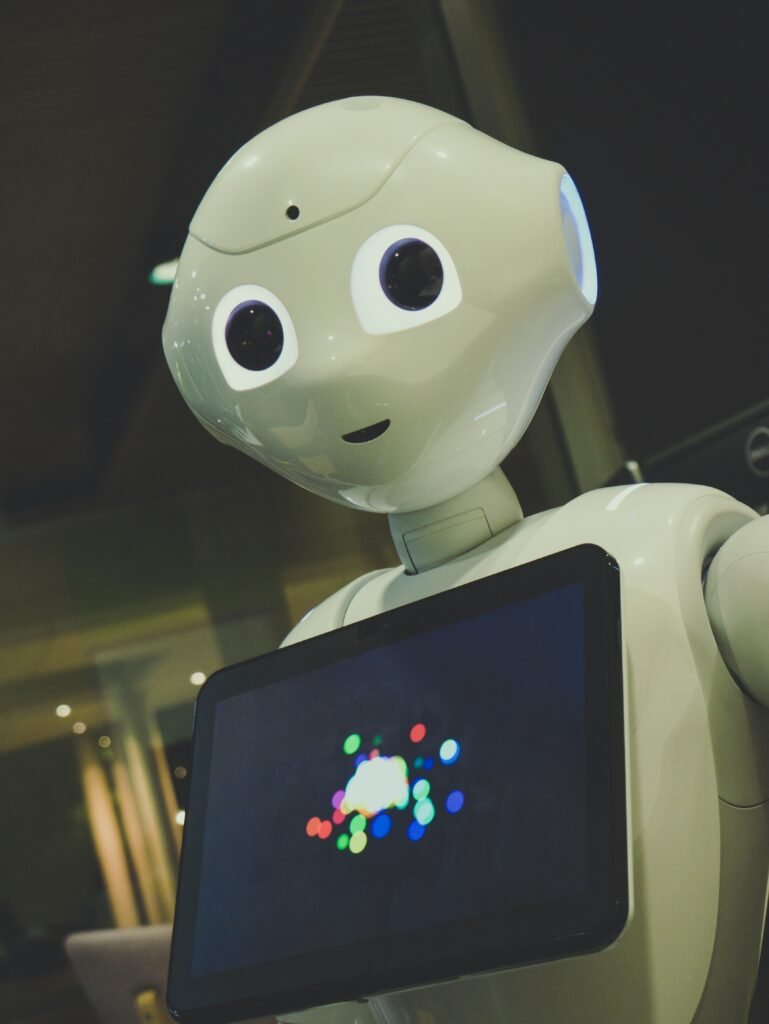Artificial Intelligence (AI) is an innovative technology that has revolutionized numerous industries, but have you ever wondered what it truly entails? In simple terms, AI refers to the ability of machines and computer systems to mimic intelligent human behavior and perform tasks that typically require human intelligence. From voice recognition to autonomous vehicles, AI has become a fundamental part of our everyday lives. In this article, we will delve into the fascinating world of AI, exploring its capabilities, applications, and how it is shaping the future of various sectors. So, get ready to be captivated by the wonders of AI!
Definition of Artificial Intelligence (AI)
Artificial Intelligence (AI) refers to the development and implementation of computer systems and software that are designed to perform tasks that typically require human intelligence. AI enables machines to interpret, analyze, and respond to data in a manner that mimics human reasoning and decision-making processes.
AI involves the creation of algorithms and models that enable computers to learn from and adapt to new information, allowing them to perform complex tasks autonomously. This field of technology aims to replicate cognitive abilities such as perception, problem-solving, learning, and language understanding, among others.
History of Artificial Intelligence
Early Concept and Development
The concept of artificial intelligence has been around for centuries, but it wasn’t until the mid-20th century that significant advancements were made. In 1956, the term “Artificial Intelligence” was coined at the Dartmouth Conference, where researchers gathered to discuss the potential of creating machines that could mimic human intelligence.
During this early period, AI pioneers focused on developing heuristic search algorithms, logical reasoning systems, as well as early machine learning techniques. Progress was slow due to limited computational power and the complexity of creating intelligent systems.
Growth and Advancements in AI
Throughout the 1970s and 1980s, AI research experienced significant growth, fueled by increased computational power and the development of new algorithms. AI began to find practical applications in various domains, such as expert systems for medical diagnosis and natural language processing.
The emergence of expert systems, which used pre-defined rules and expert knowledge to solve specific problems, marked a major milestone in AI development. These systems paved the way for the advancement of knowledge representation and reasoning, laying the foundation for future AI breakthroughs.
Modern Developments in AI
In recent years, AI has seen exponential growth and advancements, thanks to advancements in computing power and the abundance of available data. Machine learning, a subfield of AI, has revolutionized the field with its ability to enable computers to learn from data and improve performance over time.
Deep learning, a subset of machine learning that focuses on neural networks, has generated significant breakthroughs in image and speech recognition, natural language processing, and autonomous systems. This technology is powering advancements in areas such as self-driving cars, chatbots, and virtual assistants.

Types of Artificial Intelligence
Narrow AI
Narrow AI, also known as weak AI, refers to AI systems that are designed to perform specific tasks or solve specific problems. These systems are highly focused and excel in their designated domain but lack the ability to generalize beyond their narrow scope.
Examples of narrow AI include personalized recommendation systems, facial recognition technology, and voice assistants like Siri and Alexa. These systems are trained on specific datasets and programmed to perform well within their defined boundaries.
General AI
General AI, also known as strong AI or human-level AI, refers to AI systems that possess the ability to understand, learn, and apply knowledge across a wide range of tasks and domains. General AI is the goal of many AI researchers and is often associated with the idea of creating machines that can replicate human-level intelligence.
Achieving general AI remains a significant challenge, as it requires machines to possess a deep understanding of diverse domains, exhibit creativity, and demonstrate the ability to reason and make decisions in complex and uncertain situations.
Superintelligent AI
Superintelligent AI refers to AI systems that surpass human intelligence in virtually every aspect. This concept of AI is hypothetical and often associated with scenarios in which AI systems become self-aware and possess a level of thinking and intelligence that surpasses human capabilities.
The idea of superintelligent AI raises ethical concerns and considerations, as it poses questions about AI’s impact on society, human autonomy, and the potential risks associated with creating machines that surpass human intelligence.
Applications of Artificial Intelligence
Machine Learning
Machine learning is a subset of AI that focuses on enabling machines to learn from data and improve performance without being explicitly programmed. It involves the development of algorithms and models that allow computers to analyze and interpret large datasets to identify patterns, make predictions, and make informed decisions.
Machine learning has numerous applications across various industries, including finance, healthcare, e-commerce, and marketing. It is used for fraud detection, personalized recommendations, predictive maintenance, and credit scoring, among many other applications.
Natural Language Processing
Natural Language Processing (NLP) is a branch of AI that focuses on enabling machines to understand, interpret, and interact with human language. NLP allows computers to comprehend and generate human language, enabling applications such as machine translation, sentiment analysis, and voice assistants.
NLP is being employed in chatbots, virtual assistants, and language translation services, revolutionizing the way humans interact with technology. It has also facilitated advancements in automated customer support and voice-controlled devices.
Robotics
AI plays a crucial role in robotics, as it enables machines to perceive, reason, and navigate the physical world. Robotic systems equipped with AI capabilities can perform tasks autonomously, interact with the environment, and adapt to changing conditions.
Robots powered by AI are used in industries such as manufacturing, healthcare, and agriculture. They can automate repetitive tasks, assist in surgeries, and even operate in hazardous environments.
Computer Vision
Computer vision involves the development of algorithms and models that enable machines to interpret and understand visual information. AI-based computer vision systems can analyze images or videos, extract valuable information, and perform tasks such as object recognition, face detection, and image classification.
Computer vision has numerous applications, from self-driving cars that recognize traffic signs and pedestrians to surveillance systems that detect anomalies and identify potential threats. It is also used in medical imaging for diagnosis and monitoring.
Virtual Assistants
Virtual assistants, such as Siri, Alexa, and Google Assistant, are AI-powered applications that can understand and respond to human voice commands. These assistants use natural language processing and machine learning algorithms to interpret queries, provide information, and perform tasks on behalf of the user.
Virtual assistants have become an integral part of our daily lives, assisting with tasks such as setting reminders, playing music, providing weather forecasts, and even controlling smart home devices.

Ethical Considerations in Artificial Intelligence
Job Displacement and Automation
One ethical consideration in AI is the potential impact on the workforce. As AI technologies continue to advance, there is a concern that automation will lead to the displacement of workers in various industries. It is crucial to address the societal impact of AI-driven automation and ensure that measures are taken to support individuals affected by job losses.
Privacy and Data Security
Another ethical consideration in AI is the protection of privacy and data security. AI systems rely on large amounts of data to learn and make informed decisions. However, the collection, storage, and use of personal data raise concerns about the potential misuse or unauthorized access to sensitive information. Striking a balance between AI advancements and protecting individual privacy is essential.
Bias in AI Algorithms
AI algorithms are developed based on the data they are trained on, and there is a risk of introducing bias into these algorithms. If the training data is inherently biased, the AI system may replicate and amplify these biases, leading to unfair outcomes or discrimination. Addressing bias in AI algorithms requires careful attention to data collection, data labeling, and algorithm design.
Benefits of Artificial Intelligence
Increased Efficiency and Productivity
One of the significant benefits of AI is its ability to enhance efficiency and productivity across industries. AI-powered systems can automate repetitive tasks, streamline processes, and handle large volumes of data at speeds beyond human capability. This enables organizations to operate more efficiently, allocate resources effectively, and achieve higher levels of productivity.
Improved Decision Making
AI systems can analyze vast amounts of data, identify patterns, and generate insights to support decision-making processes. By leveraging AI technologies, organizations can make data-driven decisions based on accurate and timely information, reducing human errors and biases. This improves the overall quality of decision-making and enhances strategic planning.
Enhanced Customer Experience
AI enables organizations to deliver personalized and tailored experiences to their customers. By analyzing customer data, AI systems can understand individual preferences, anticipate needs, and provide relevant recommendations. This level of personalization enhances customer satisfaction, loyalty, and overall user experience.
Medical Advancements
AI has the potential to revolutionize healthcare by enabling more accurate diagnoses, predicting medical outcomes, and improving patient care. AI-powered systems can analyze medical records, medical images, and genetic data, aiding in early detection of diseases and providing insights for personalized treatment plans. This can lead to improved health outcomes, reduced healthcare costs, and overall advancements in medical research.

Challenges and Limitations of Artificial Intelligence
Unemployment and Workforce Changes
While AI brings many benefits, there are concerns about the displacement of workers due to automation. Certain job roles may become obsolete as AI systems take over tasks traditionally performed by humans. Addressing the potential impact on employment and ensuring opportunities for reskilling and upskilling is crucial in mitigating the negative consequences of AI-driven workforce changes.
Ethical and Legal Issues
The development and deployment of AI raise various ethical and legal concerns. These include issues of accountability, transparency, and responsibility for AI decisions. Determining who is responsible in case of AI errors or accidents, addressing fairness and bias in AI algorithms, and ensuring compliance with regulations and industry standards are essential considerations in the ethical use of AI.
Technical Limitations and Failures
AI systems are not perfect and can be prone to technical limitations and failures. Errors can occur due to biases in training data, limitations in algorithms, or unexpected scenarios that the AI system is not designed to handle. It is crucial to recognize these limitations, conduct rigorous testing and validation, and continuously monitor and improve AI systems to minimize the risk of failures and ensure reliable performance.
Future Trends in Artificial Intelligence
AI in Healthcare
The future of AI in healthcare is promising. AI is expected to play a crucial role in early disease detection, personalized treatment plans, and drug discovery. Intelligent systems will provide real-time patient monitoring, enabling remote healthcare, and telemedicine. AI will continue to empower medical professionals and researchers in advancing healthcare solutions and improving patient outcomes.
AI in Transportation
AI is set to revolutionize the transportation industry with the advent of self-driving cars, intelligent traffic management systems, and optimized logistics. AI-powered algorithms will enhance traffic efficiency, reduce accidents, and improve transportation sustainability. Autonomous vehicles will transform the way people and goods are transported, making transportation safer, greener, and more efficient.
AI in Education
AI has the potential to transform education by personalizing learning experiences, enhancing student engagement, and improving academic outcomes. Intelligent tutoring systems can adapt to individual learning styles, provide personalized feedback, and offer tailored learning pathways. AI can also assist in administrating tasks, such as grading and course scheduling, allowing educators to focus more on student support and instruction.
Ethical AI Standards
As AI continues to advance, the need for ethical AI standards becomes increasingly important. Establishing guidelines and regulations to ensure the responsible and ethical design, development, and use of AI will be crucial. This includes transparency in AI decision-making processes, addressing biases, and considering the potential societal impact of AI technologies.
Concerns Over Artificial Intelligence
Existential Threats
One of the concerns surrounding AI is the hypothetical notion of superintelligent AI posing an existential threat to humanity. It raises questions about the control and autonomy of AI systems, the potential for unintended consequences, and risks associated with creating machines that surpass human intelligence. Ethical and safety considerations are vital in ensuring that AI advancements align with human values and do not pose significant risks.
AI Bias and Discrimination
Another concern is the potential for bias and discrimination in AI systems. If AI algorithms are trained on biased or incomplete datasets, they can perpetuate and amplify societal biases, leading to unfair outcomes for certain groups. It is crucial to address bias in data collection, algorithm design, and decision-making processes to ensure that AI systems are fair, unbiased, and inclusive.
Human Control and Autonomy
The level of control and autonomy given to AI systems is a significant concern. As AI technologies advance, there is a need to define boundaries and ensure that humans retain control over critical decisions. Balancing the benefits of AI automation with human oversight and accountability is essential to prevent the delegation of important ethical and moral choices to AI systems.
Conclusion
Artificial Intelligence is a rapidly evolving field that has the potential to revolutionize a wide range of industries and enhance various aspects of our lives. From the early concept and development to modern advancements, AI has come a long way. Narrow AI, General AI, and the hypothetical Superintelligent AI represent different levels of AI capabilities.
AI finds applications in machine learning, natural language processing, robotics, computer vision, and virtual assistants. The ethical considerations in AI encompass job displacement, privacy, data security, and biased algorithms. However, the benefits of AI include increased efficiency and productivity, improved decision making, enhanced customer experience, and advancements in the medical field.
Challenges and limitations, such as unemployment, ethical and legal issues, and technical failures exist but can be addressed through careful planning, oversight, and continuous improvement. The future of AI holds exciting prospects, including healthcare advancements, transportation transformation, education enhancements, and the development of ethical AI standards. However, concerns remain regarding existential threats, bias, and discrimination, and the balance between human control and autonomy.
In conclusion, AI has tremendous potential, but it is crucial to approach its development and deployment with careful consideration of ethical, legal, and societal implications. By leveraging AI responsibly and ethically, we can harness its benefits to create a better and more inclusive future.






